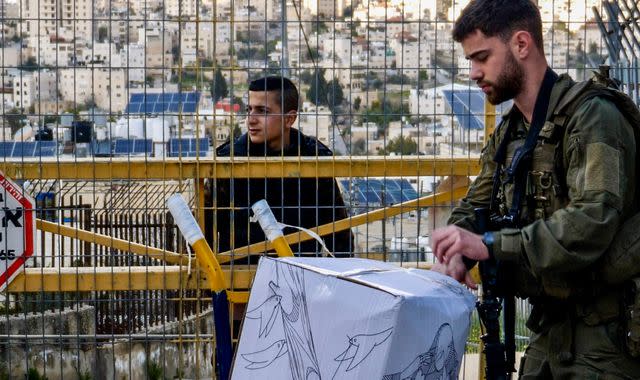The war may be in Gaza, but its effects can mean starvation in the West Bank

There is an urgency to the work of the aid team in the West Bank as the war in Gaza becomes even more grim.
The team pack boxes with staples - flour, oil, rice and lentils - to be delivered to those in need.
"It is in an economic catastrophe at the moment," Anton Goodman tells me.
Anton is an Israeli Jewish human rights activist working in the West Bank alongside Palestinians to deliver food aid at a time when more and more families are facing difficulties.
"When we're talking about hundreds of thousands of Palestinians who were working in Israel on 7 October, suddenly their jobs ended and they haven't received any salaries since then.
"Even the Palestinian Authority's staff haven't been receiving a salary, many of them.
"Along with that, you've got a lot of army restrictions around freedom of movement and getting to workplaces - and also the settler violence on the ground."
Anton knows he is in a tiny minority as public opinion after 7 October hardens. Many Israelis are convinced, more than ever, that the peace camp is misguided.
"We can have reactions in my community, even in my friends' circle, saying, why are you helping the enemy? Why are you not helping our people at this time?
"Or it can be, you know, more aggressive reactions when you come up against soldiers at a checkpoint to find out what you're doing. And they can be quite aggressive."
Read more:
Why US abstention on ceasefire vote is significant
CCTV shows Israeli soldier assaulting child
But Anton hopes this type of direct action will provide the building blocks for greater cooperation and coexistence in the future.
"There's a hardening and a radicalisation of attitudes in favour of the war… at the same time within Israeli society, you're seeing a liminal moment, a moment where people don't have the answers and feel deeply destabilised and insecure.
"And suddenly people are willing to think about and consider alternatives to military solutions."
Click to subscribe to the Sky News Daily wherever you get your podcasts
The organisers load the boxes onto a truck. Each one is enough to feed a family for a week.
The journey from Ramallah to Hebron is not far but it is a circuitous route avoiding and getting stopped at checkpoints on the way to deliver the much-needed aid.
Along the route we pass Israeli watchtowers - the architecture of a military occupation which controls the lives of millions of Palestinians.
Finally, after more diversions and delays, the truck arrives and the cargo of aid is unloaded.
Food insecurity in the West Bank has increased as a result of the war in Gaza, Issa Amro tells me.
Issa is a Palestinian activist helping to provide relief to thousands of families. He says the desperation he sees now is unprecedented.
"It's the first time I see people starving inside Hebron City and other parts of West Bank and for sure in Gaza."
From this depot in Hebron the boxes will be distributed across the city on foot. At the last checkpoint there's another wait before the aid can pass.
Even a simple operation like this one to deliver much-needed small boxes of food is fraught with difficulties in the face of Israel's unending military occupation.

 Yahoo News
Yahoo News 
